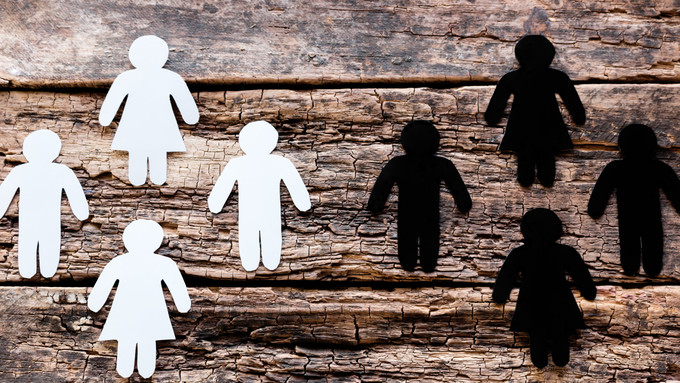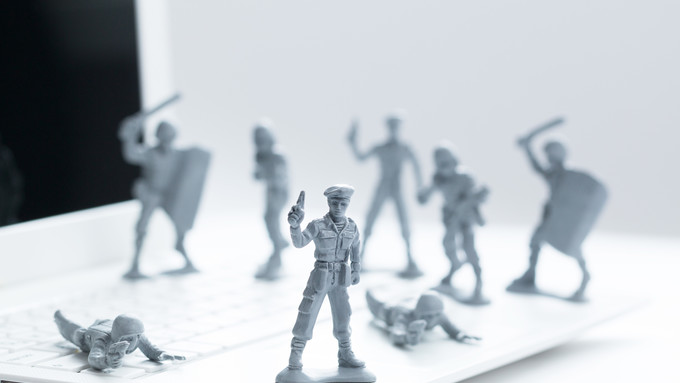Addressing Superiority Complexes & Racial Bias Prophetically
When the Messenger of Allah ﷺ recited the Qur’an at home one evening, three skeptical Meccans quietly approached and listened from outside the walls. Intrigued by the eloquent recital, they returned for two additional nights to listen. Afterwards two of them, Al-Akhnas and Abu Jahl, met to reconcile the unexplainable Revelation. Abu Jahl said:
"We have always rivaled the tribe of Muhammad. When they were generous we were the same – like horses neck and neck in a race. But indeed there is a Prophet from amongst them who receives a Revelation from the Heavens. How can we ever compete with this? We can never believe nor accept what he says."1
At a time of great ignorance, divine enlightenment was considered insufficient for some. At a place where poetry was the pinnacle of skill, the linguistic beauty of the Qur’an was dismissed. The basis for refusal was not for the Revelation itself, rather simply because the one delivering it ﷺ was from another sub-tribe, outside their respective circle.
The Human Group Psyche
This preserved narration illustrates a shortcoming of the human psyche that unfortunately permeates within our Muslim community. It highlights the pervasive notions of group superiority and prejudice. When we think of group superiority in the context of tribalism, nationalism, or racism, we typically focus on its impact on personal interactions, discriminatory institutionalized practices, or selective responses to global events. Before examining the after effects of superiority however, we must better understand the origins and how it takes shape — comprised of arrogance, uninformed judgments, and stereotypical beliefs about others. It is a syndrome manufactured by Iblis himself, demonstrated by his refusal to acknowledge the Majesty of The Creator through His creation of Adam (may peace be upon him). It was the syndrome that contributed to the Quraish’s eventual demise after rejecting the Divine truth and it is serving as the fuel to modern-day extreme movements of nationalism, mistrust and inferiority of others ultimately leading to sociopolitical turmoil worldwide.
Bias
At a rudimentary level, prejudice and superiority complexes stem from stereotypes — generalized assumptions made about groups of others. Social scientists believe we instinctively stereotype to reconcile the complexities of people around us, thereby reducing anxiety of the unfamiliar and resolving any internal disagreements within our minds (cognitive dissonance). Evolutionarily speaking, we trust the known and suspect the unknown. Therefore, to quickly and easily compartmentalize mentally we identify others based on the most salient features, biologically unalterable or physical in nature — skin tone, race, gender, perceived age, or visual appearance/upkeep (indicator of socioeconomic class). Although mental compartmentalization helps reduce ambiguity, it comes at the expense of oversimplifying perceptions about entire groups of people. Stereotypes unjustly sustain social inequalities and resentment. They fuel a belief that others get what they deserve because of who they are, a phenomenon known as the "just world hypothesis". Rather than attributing an adverse encounter with someone to something purely individualistic or circumstantial such as “this person is having a rough day”, a judgment is made out of something perceived as inherent to that person’s demographic group, such as “those people are inherently unpleasant”. By negatively stereotyping and disparaging others, people naturally embolden their own egos and own group superiority. This leads groups to inevitably pledge supremacy over others and differentiate the “us” from “them”. Then when our groups are challenged we reflexively feel the need to defend and uphold a sense of self-pride on behalf of that group and ourselves by extension. This sort of rationalization justifies our continued belonging and reduces anxiety from confrontations to our self worth.
Besides forms of prejudice that are visually apparent (e.g. slurs, open intolerance), we are most routinely susceptible to implicit forms of bias — stereotypes and prejudices that are methodically embedded from outside conscious awareness. These are seldom recognized and automatically triggered, surfacing into our thoughts, feelings and resulting behavior. Implicit associations form easily over time, not because they are innate, but because they are learned from subtle, perpetual indoctrination of stereotypes that infer a false sense of others’ mediocrity. Implicit bias explains how most decent, well-intentioned people fall into a prejudicial vortex, often times discriminating against others before realizing what they have felt or done or without recognizing exactly why they have felt or done it. There are some noteworthy tests that anonymously measure one’s implicit bias and yield enlightening results.
Tribalism of yesterday is mirrored by the nationalism, nepotism, and supremacy of today. Whether explicit or implicit, stereotypes and superiority complexes have always inevitably produced disparities.
Islamic Purification From Prejudice
In the most direct and assertive fashion, Allah addresses in the Qur’an underlying attitudes and behaviors of group superiority:
“Oh you who believe, let not a group of people ridicule or mock another group. Perhaps the one [mocked] is better than they are, nor let women deride other women, for perhaps the one [derided] is better than they are. And find not faults with one another nor insult others using offensive names [slurs]. Wretched is the name of disobedience after having faith. And whoever does not repent are indeed the unjust. Oh you who believe, avoid negative assumptions [of others] for indeed suspicion at times is a sin” (49:11-12)
"There are some remnants from the days of ignorance in you", the Messenger ﷺ once reminded a companion who perceived another’s ethnicity as inferior 2. The Messenger passionately grasped the universal pursuit of justice, equality and unity — questioning immoral socio-political norms during a period embodied by greed and opportunism, slander and exploitation, mistreatment of women and orphans, scoffing the poor while pandering the affluent, slaying of newborns, and widespread racial injustices — perpetuated by the elite of a society where tribal laws governed the lands on the privileged backs of ancestral lineage and kinship bonds.
Unprecedented for the time and place, the Prophet ﷺ dismantled caste systems and divisions of ethnic and class superiority, going beyond simple toleration. He ﷺ brought together communities of every background — the wealthy and the poor, the Muhajirun of Mecca and the Ansar of Medina, and companions from Persia, Abyssinia, and Byzantine. During the early years of persecution, he ﷺ urged his companions to take refuge with a compassionate Abyssinian Christian king. He ﷺ stood to honor deceased souls from passing Jewish funeral processions. He ﷺ emancipated the famous Bilal-Ibn-Rabah (may Allah be pleased with him) from tainted shackles of men and placed him high atop the holiest site as a freed slave of God and the greatest Muezzin in history. And famously in his final sermon, incomparable to any open declaration before its time, the Messenger ﷺ asserted no distinction be made whatsoever in superiority between Arabs, non-Arabs, Blacks or Whites, but instead by those with pious hearts and good character in action. The legacy of the Mercy to Mankind ﷺ was enveloped in humility and it matched his actions regarding justice and dignity towards others.
Imam Al-Ghazali once said that when God wishes His servant well, He grants the person insight into the faults that lie within his or her soul. Arrogance, narcissism and entitlement can be tempered by self-reflecting on our truly insignificant status in the vastness of creation. The Messenger ﷺ reminded us that every person that ever existed came from Adam (may peace and blessings be upon him) and Adam was created from mere dust. To increase in humility, one needs an increase in generosity and supplication towards the well-being of others — thus softening the heart to empathize with legitimate grievances of one another. God-given abilities and challenges are different for each individual, shaped by environmental and societal circumstances in that person’s life, and at times irrespective of the group one belongs to.
Allah instructs humanity to interact and learn about one another in the well-known ayah: ‘O mankind! We created you from male and female, and made you into nations and tribes that you may know each other. Surely the most honored of you with Allah is the most pious of you. Indeed God is All-Knowing and Fully Aware’ (49:13).
Our Responsibility
Ethnicity and race are sometimes viewed as irrelevant, mistakenly promoting a “colorblind” approach to recognizing others. However these meaningful components among others, like gender, make up the fabric of a person’s identity, drive personal experiences, and deserve to be dignified.
Prejudice is greatly reduced by interacting with others particularly in environments that require cooperation towards a common goal, and experiences that demonstrate how other groups are more similar to oneself than are different — a technique that converts the “us versus them” into “we all”.
While individualizing others is important, we should be careful not to carve out those we are interacting with as the exceptions while maintaining negative stereotypes about the rest of their group (e.g. “he is like myself, one of us — nothing like the rest of them”).
Alongside humility and education we must be upholders of justice because the presence of diversity does not assume presence of equality. Individual overt incidents of prejudice like name-calling are unlike institutional systems of discriminatory policies and procedures.
Allah commands us to speak to truth even if it is against ourselves3. We cannot question existing injustice without personally asking why our hearts maintain attitudes of self-superiority and entitlement and collectively asking why our communities impose and enable discriminatory practices upon select others. The collective reformation of society will always begin with a personal reformation of the self (Islāh). In these are signs for us to reflect.
And Allah Subhanahu Wa’ Ta’ala (The Most Glorified) knows best.
1. Narrated by Az-Zuhri; Ibn Ishaaq
2. This refers to the incident between the two companions, Bilal and Abu Dharr. Narrated by Ma’rur; Sahih Bukhari Vol 1, Book 2, Hadith 29.
3. Surah An-Nisa (4), Ayah 135
Activism Related Articles



Why We Must Recapture Scholarly Discourse from Extreme Bloggers
One cannot deny the move towards rhetoric and practice in the Western Muslim community that is more liberal, reformist, and progressive, but the extreme position some have taken in response to it is not only harmful, ineffective, and unwise, but decidedly un-Islamic.